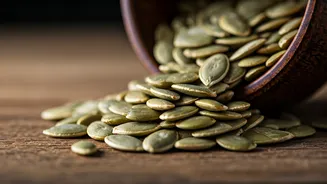Nutrient-Rich Powerhouse
Pumpkin seeds are a treasure trove of essential nutrients, providing a rich source of vitamins, minerals, and antioxidants. These small seeds are packed
with magnesium, vital for various bodily functions, including blood sugar control and blood pressure regulation. They also offer a significant amount of zinc, crucial for immune function and wound healing. Furthermore, pumpkin seeds are a good source of iron, vital for transporting oxygen in the body, and copper, which aids in the absorption of iron and the formation of red blood cells. The presence of antioxidants, such as vitamin E and carotenoids, helps protect cells from damage caused by free radicals. Incorporating these nutrient-dense seeds into your diet can significantly contribute to overall health and well-being. Eating a small handful regularly can provide many of these nutrients.
Boost Heart Health
Pumpkin seeds promote heart health due to their various beneficial components. They are rich in magnesium, which helps regulate blood pressure, reducing the risk of hypertension, a major risk factor for heart disease. These seeds also contain antioxidants that combat oxidative stress, protecting blood vessels from damage and supporting healthy arterial function. Additionally, pumpkin seeds provide a good dose of fiber, which helps lower LDL cholesterol levels. Studies have shown that regularly consuming pumpkin seeds can contribute to improved cardiovascular health. Moreover, they contain phytosterols, plant compounds that can help reduce cholesterol absorption. Incorporating pumpkin seeds into your diet can be a proactive step towards maintaining a healthy heart and reducing the risk of heart-related issues.
Improve Prostate Health
Pumpkin seeds can play a significant role in supporting prostate health, particularly in men. They contain compounds, including phytosterols and zinc, that may help reduce the symptoms of an enlarged prostate (benign prostatic hyperplasia or BPH). Studies suggest that these compounds can help inhibit the growth of prostate cells and reduce the inflammation associated with BPH. The high zinc content is particularly important, as zinc is essential for prostate health. Pumpkin seeds can also help alleviate the need to urinate frequently, a common symptom of BPH. Regularly including pumpkin seeds in the diet can be a natural approach to promoting prostate health and potentially reducing the risk of prostate-related issues. Consulting with a healthcare professional before making significant dietary changes is always advisable.
Enhance Sleep Quality
Pumpkin seeds can improve sleep quality due to their high tryptophan content. Tryptophan is an amino acid that the body uses to produce serotonin, which is then converted into melatonin, the hormone responsible for regulating sleep cycles. Consuming pumpkin seeds can help boost melatonin levels, leading to better sleep. Pumpkin seeds also provide magnesium, which promotes muscle relaxation and helps calm the nervous system, further aiding in achieving a restful night’s sleep. The combination of tryptophan and magnesium makes pumpkin seeds a natural sleep aid. For those struggling with sleep issues, incorporating pumpkin seeds into the diet can potentially help improve sleep quality. Try eating a small amount before bed to help you relax and fall asleep easier. However, it's important to consult a healthcare provider for any persistent sleep problems.
Support Diabetes Control
Pumpkin seeds can be beneficial for individuals with diabetes due to their ability to help regulate blood sugar levels. They are rich in magnesium, a mineral that plays a role in glucose metabolism and insulin sensitivity. Adequate magnesium intake is associated with a reduced risk of type 2 diabetes and improved blood sugar control in those who have the condition. Additionally, pumpkin seeds have a low glycemic index, meaning they do not cause rapid spikes in blood sugar levels after consumption. The fiber content in pumpkin seeds also helps slow down the absorption of sugar, further contributing to stable blood sugar levels. Studies suggest that incorporating pumpkin seeds into the diet can be a helpful strategy for diabetes management. Consult with a healthcare professional to determine how pumpkin seeds can fit into a diabetes management plan.


















